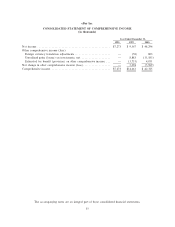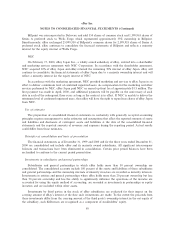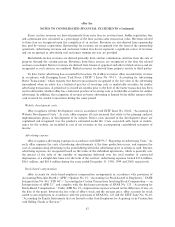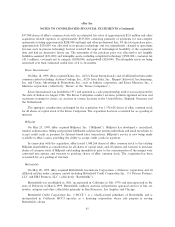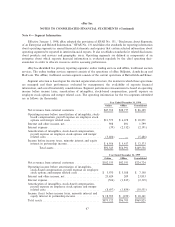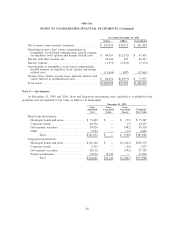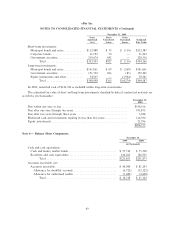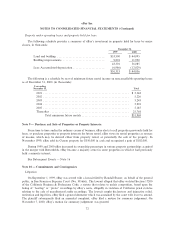eBay 2000 Annual Report Download - page 68
Download and view the complete annual report
Please find page 68 of the 2000 eBay annual report below. You can navigate through the pages in the report by either clicking on the pages listed below, or by using the keyword search tool below to find specific information within the annual report.eBay Inc.
NOTES TO CONSOLIDATED FINANCIAL STATEMENTS (Continued)
Income taxes
Income taxes are accounted for using an asset and liability approach which requires the recognition of taxes
payable or refundable for the current year and deferred tax liabilities and assets for the future tax consequences of
events that have been recognized in eBay's financial statements or tax returns. The measurement of current and
deferred tax assets and liabilities are based on provisions of the enacted tax law; the effects of future changes in tax
laws or rates are not anticipated. The measurement of deferred tax assets is reduced, if necessary, by the amount of
any tax benefits that, based on available evidence, are not expected to be realized.
Recent accounting pronouncements
In June 1998, the Financial Accounting Standards Board (""FASB'') issued SFAS No. 133, ""Accounting
for Derivatives and Hedging Activities.'' SFAS No. 133 establishes accounting and reporting standards for
derivative instruments, including certain derivative instruments embedded in other contracts, and for hedging
activities. In June 1999, the FASB issued SFAS No. 137, ""Accounting for Derivative Instruments and
Hedging Activities Ì Deferral of the EÅective Date of FASB Statement No. 133,'' which deferred the
eÅective date until the Ñrst Ñscal year ending on or after June 30, 2000. In June 2000, the FASB issued SFAS
Statement No. 138, ""Accounting for Certain Derivative Instruments and Certain Hedging Activities Ì an
Amendment of SFAS 133.'' SFAS No. 138 amends certain terms and conditions of SFAS 133. SFAS 133
requires that all derivative instruments be recognized at fair value as either assets or liabilities in the statement
of Ñnancial position. The accounting for changes in the fair value (i.e., gains or losses) of a derivative
instrument depends on whether it has been designated and qualiÑes as part of a hedging relationship and
further, on the type of hedging relationship. eBay will adopt SFAS No. 133, as amended, in its quarter ending
March 31, 2001. Upon adoption, the cumulative eÅect to net income and other comprehensive income of this
change in accounting method is a gain of approximately $650,000 and a loss of approximately $2.6 million,
respectively, net of tax.
In July 2000, the EITF reached a consensus with respect to EITF Issue No. 99-19, ""Reporting Revenue
Gross as a Principal versus Net as an Agent.'' EITF 99-19 addressed whether a company should report
revenue based on the gross amount billed to a customer because it has earned revenue from the sale of the
goods or services or the net amount retained (that is, the amount billed to the customer less the amount paid
to a supplier) because it has earned a commission or fee. eBay adopted EITF 99-19, and such adoption did not
have a material impact on its consolidated Ñnancial statements.
In March 2000, the EITF reached a consensus on EITF Issue No. 00-14, ""Accounting for Certain Sales
Incentives.'' This consensus provides guidance on the recognition, measurement, and income statement
classiÑcation of sales incentives which are oÅered voluntarily by a vendor without charge to customers that can
be used in, or that are exercisable by a customer as a result of, a single exchange transaction. eBay evaluated
the provisions of the guidance in conjunction with its policies and concluded that eBay is in compliance with
this pronouncement.
In July 2000, the EITF issued EITF Issue No. 00-15, ""ClassiÑcation in the Statement of Cash Flows of
the Income Tax BeneÑt Realized by a Company upon Employee Exercise of a Non-qualiÑed Stock Option.''
EITF 00-15 addresses the cash Öow statement presentation of the tax beneÑt associated with nonqualiÑed
stock options. eBay receives an income tax deduction for the diÅerence between the exercise price and the
market price of a nonqualiÑed stock option upon exercise by the employee. EITF 00-15 concludes that the
income tax beneÑt realized by eBay upon an employee exercise of stock options should be classiÑed in the
operating section of the cash Öow statement. The EITF is eÅective for all quarters ending after July 20, 2000.
eBay adopted EITF 00-15, and such adoption did not have a material impact on its consolidated Ñnancial
statements.
In July 2000, the EITF issued EITF Issue No. 00-16, ""Recognition and Measurement of Employer
Payroll Taxes on Employee Stock-Based Compensation.'' This Issue addresses how an entity should account
63




